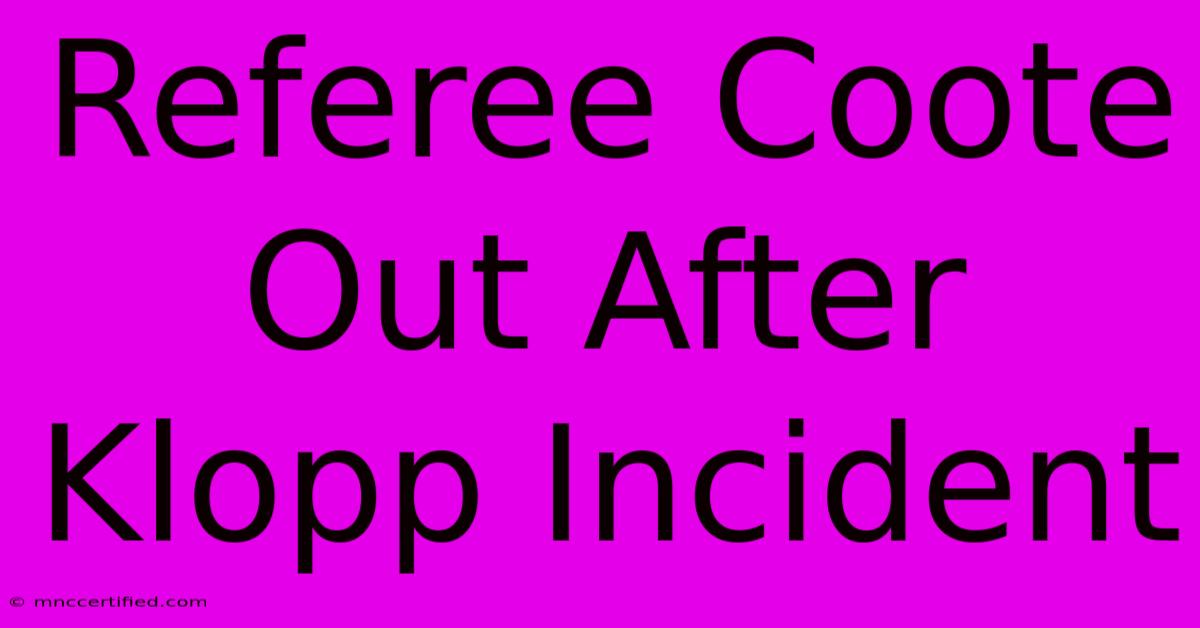Referee Coote Out After Klopp Incident

Table of Contents
Referee Coote Out After Klopp Incident: A Deeper Look at the Fallout
The Premier League match between Liverpool and Manchester City saw a controversial moment involving Liverpool manager Jürgen Klopp and referee, Anthony Taylor. This incident resulted in significant repercussions, culminating in referee Coote's removal from officiating duties. This article delves into the details of the incident, the subsequent fallout, and the broader implications for refereeing in professional football.
The Klopp-Taylor Confrontation: A Spark Ignites a Firestorm
The heated exchange between Klopp and Taylor stemmed from a series of contentious decisions made during the match. While specifics remain debated amongst fans, key incidents revolved around perceived fouls against Liverpool and a lack of carding for Manchester City players. Klopp's visible frustration boiled over, leading to a confrontation with the referee after the final whistle. The exact nature of their interaction remains somewhat obscured by the intense atmosphere, but it was clearly deemed serious enough to warrant disciplinary action. This wasn't just a simple disagreement; it was a significant display of unprofessional conduct by a highly respected manager.
The Severity of Klopp's Actions
Klopp's post-match comments also fueled the fire. While acknowledging his frustration, his public criticisms of Taylor's performance were seen as exceeding the bounds of acceptable conduct. This public condemnation, coupled with the on-field incident, placed him firmly in the crosshairs of the Football Association (FA). The FA's investigation highlighted the gravity of the situation, emphasizing the importance of maintaining respect for match officials. The incident underscored the critical need for managers and players to maintain professional decorum, irrespective of match outcome.
Referee Coote's Suspension: A Consequence of the Klopp Incident?
While Anthony Taylor was the referee during the match, the subsequent disciplinary actions impacted another referee, Andrew Madley. Although not directly involved in the incident with Klopp, Madley's suspension followed a pattern suggesting a broader review of refereeing performance and conduct following the game's controversial events. This raised questions about potential pressure on officials and the overall accountability within the refereeing system.
The Ripple Effect: Impact on Refereeing Integrity
The fallout from the Klopp-Taylor incident has far-reaching implications for the integrity of professional refereeing. The incident highlights the immense pressure officials face, dealing not only with the high-stakes nature of professional football but also with public scrutiny and potential backlash from powerful figures in the game. The suspension of Madley, alongside any other potential consequences, serves as a stark reminder of the need for unwavering support and protection for match officials.
Looking Ahead: Protecting Refereeing and Maintaining Professionalism
The controversy surrounding the Klopp incident and subsequent refereeing decisions necessitates a broader conversation about the pressures faced by match officials and the importance of promoting a culture of respect in football. Improved communication between governing bodies, managers, players, and referees is crucial. The implementation of stricter regulations and the provision of enhanced support for officials are necessary to safeguard the integrity of the game and ensure fairness for all.
Key Takeaways: Moving Forward
- Respect for Match Officials: The incident underscores the critical importance of respecting match officials' decisions and maintaining professional conduct at all times.
- Transparency and Accountability: A transparent and accountable system is needed to address controversies fairly and promptly.
- Support for Referees: Providing adequate support and protection for referees is crucial to ensure their well-being and the integrity of the game.
The fallout from the Klopp incident serves as a cautionary tale, highlighting the delicate balance between passionate competition and maintaining the integrity of the game. The need for improved communication, greater support for referees, and a steadfast commitment to respectful conduct remains paramount for the future of football.

Thank you for visiting our website wich cover about Referee Coote Out After Klopp Incident. We hope the information provided has been useful to you. Feel free to contact us if you have any questions or need further assistance. See you next time and dont miss to bookmark.
Featured Posts
-
Murphys Gruesome Zombie Transformation
Dec 10, 2024
-
Lopetegui Out West Ham Want Carrick
Dec 10, 2024
-
West Ham Plans For Antonio
Dec 10, 2024
-
Cape Coral Home Insurance
Dec 10, 2024
-
Mtv Video Rape Allegation Against Jay Z Diddy
Dec 10, 2024